PRINCETON, NJ -- For the first time since 1991, more than 6 in 10 Americans -- 63% -- say their sympathies in the Middle East situation lie more with the Israelis than with the Palestinians. Fifteen percent side more with the Palestinians, down slightly from recent years, while a combined 23% favor both sides, favor neither side, or have no opinion.
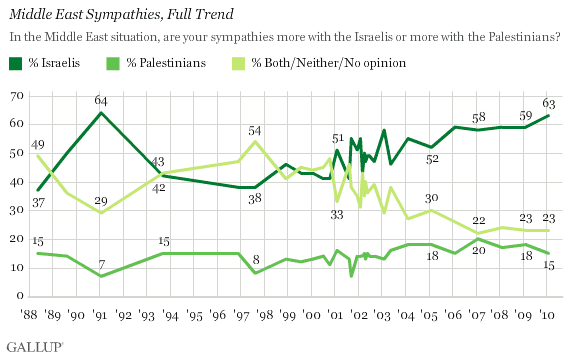
The 63% sympathizing with Israel today is statistically unchanged from the 58% to 59% seen from 2006 to 2009; however, it is considerably higher than most of the previous readings on this Gallup measure since 1993. The trend includes two 38% readings in 1996 and 1997.
Only in January 1991 -- shortly after Israel was hit by Iraqi Scud missiles during the Gulf War -- did U.S. support for Israel register as high as it does today.
"Americans' attitudes about the prospects for peace are little changed from last year, but are among the more pessimistic Gallup has found since initiating the question in 1997."
Over the last five years, support for Israel has increased slightly among Republicans (rising from about 77% for each of the past several years to 85% today) and independents, but has stayed roughly the same among Democrats. Since 2001, however, there has been a more dramatic shift in partisan attitudes: a 25-point increase in sympathy for Israel among Republicans and an 18-point increase among independents. Even on this longer-term basis, support for Israel among Democrats has been relatively flat.
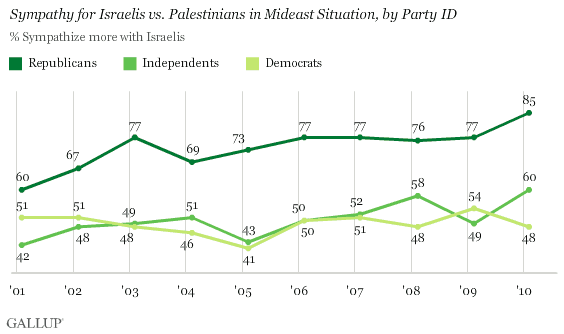
The latest findings come from Gallup's annual World Affairs survey, updated Feb. 1-3, 2010. In the same poll, Americans were asked to give their opinions of 20 countries, including Israel and the Palestinian Authority. Israel's 67% favorable rating ranks among the highest and the Palestinian Authority's 20% among the lowest. However, current favorability toward Israel is similar to where it has been for the last several years, and favorability toward the Palestinians is on the high end of the range since 2000.
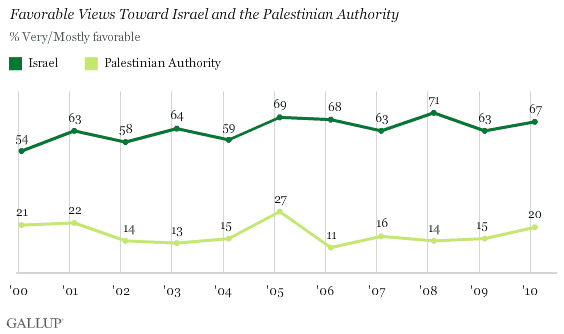
Outlook for Peace
Additionally, the poll asked Americans about the chances that peace will eventually come to the Middle East. Currently, 30% think "there will come a time" when "Israel and the Arab nations will be able to settle their differences and live in peace"; 67% are doubtful.
Americans' attitudes about the prospects for peace are little changed from last year, but are among the more pessimistic Gallup has found since initiating the question in 1997. The only time fewer Americans were optimistic about Arab-Israeli peace (27%) was in July 2006, during the Israeli-Hezbollah war in southern Lebanon. While public optimism has since remained low, it has shown longer-term variations, and has a history of rebounding -- particularly after U.S.-brokered peace talks in 1999, 2003, and 2005.
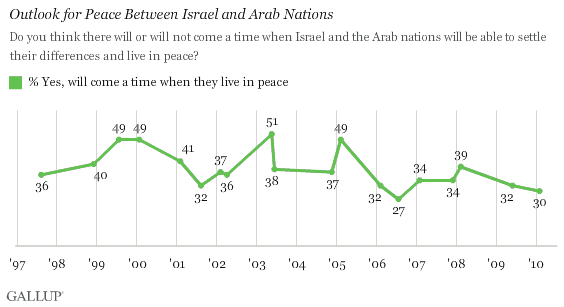
With 39% of Democrats saying peace will come about, this group is more optimistic than either Republicans (25%) or independents (26%) are about Arab-Israeli peace. This has been the general pattern for the past decade; however, the gap between Democrats and others has expanded in recent years.
Independents have become significantly less optimistic about the chances of peace since President Obama took office: the percentage believing peace will come about fell from 41% during the last year of the Bush administration (in February 2008) to 30% in May 2009, and stands at 26% today. Optimism among Republicans fell below 30% in 2007 and has since remained low. Democrats' views have been fairly steady since 2001, except for a brief spurt of optimism in 2005 -- seen among all three party groups (a major Israeli-Palestinian peace summit that resulted in a truce agreement was underway at the time of that survey).
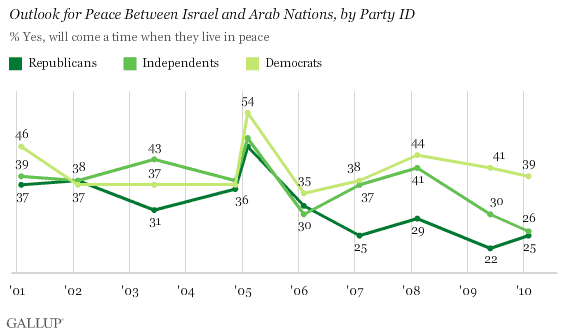
Bottom Line
In the ongoing Israel-Palestinian conflict, a striking 63% of Americans currently say their sympathies lie more with the Israelis, the highest level in nearly 20 years. Support for the Palestinians, at 15%, is about average for the same period. At the same time, Gallup finds Americans' fundamental views of Israel no more favorable than they have been for the past several years. Israel does continue to enjoy a substantial advantage over the Palestinian Authority in its general image, a fact that clearly colors the ways Americans view the conflict.
Americans are no more optimistic today than they were last year that peace can be reached between Israel and the Palestinians -- and they are, in fact, less optimistic than they were toward the end of the Bush administration. This is largely owing to a drop in optimism among independents.
Survey Methods
Results are based on telephone interviews with a random sample of 1,025 national adults, aged 18 and older, conducted Feb. 1-3, 2010. For results based on the total sample of national adults, one can say with 95% confidence that the maximum margin of sampling error is ±4 percentage points.
Interviews are conducted with respondents on land-line telephones (for respondents with a land-line telephone) and cellular phones (for respondents who are cell-phone only).
In addition to sampling error, question wording and practical difficulties in conducting surveys can introduce error or bias into the findings of public opinion polls.
